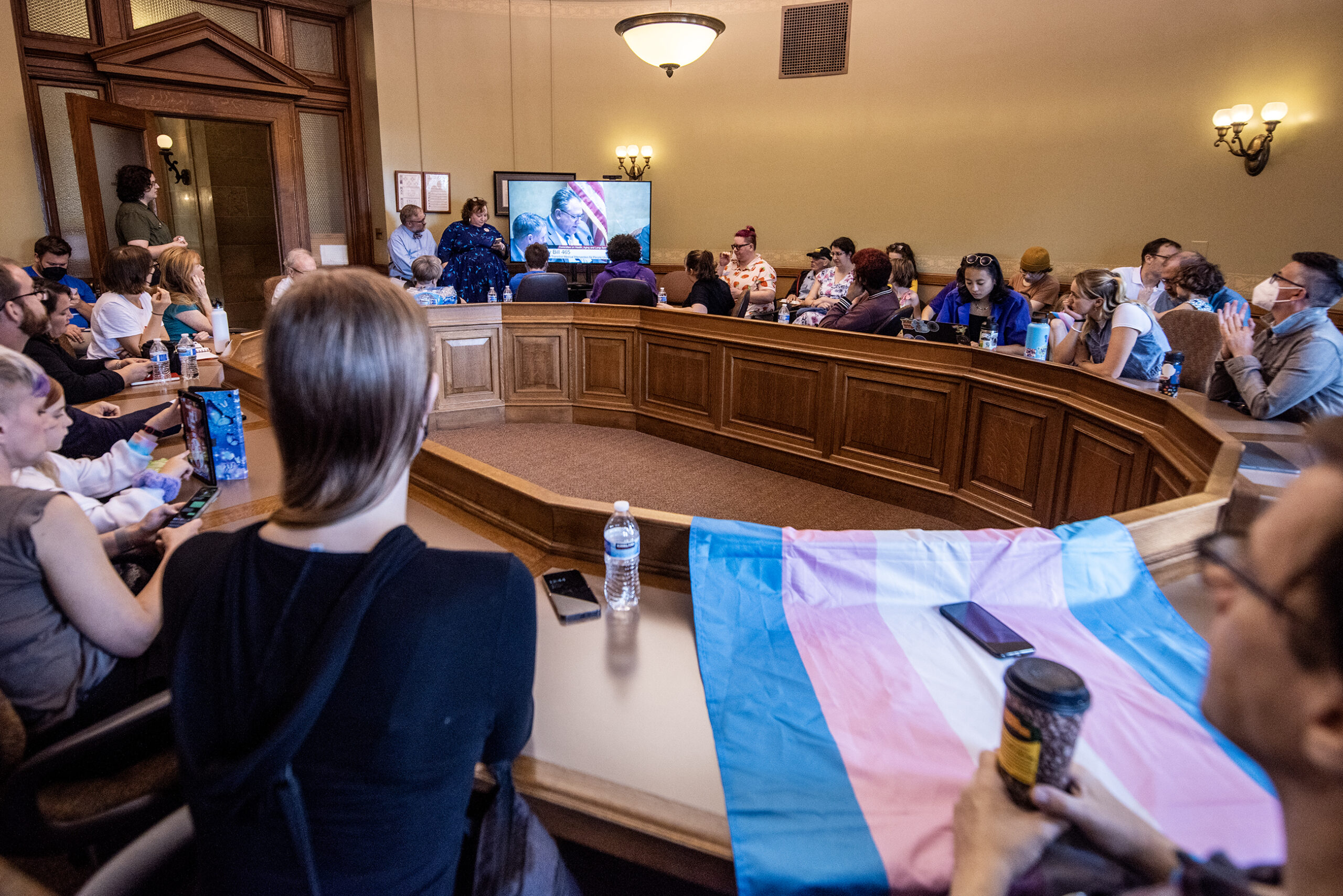The Watertown Unified School District approved a “Gender Support Plan,” Monday, shifting to more restrictive policies for transgender students.
The Watertown School District board had two options — keep the status quo or adopt the new wide-ranging policy.
Before voting, board members heard from dozens of community members, parents and students on both sides of the issue Monday night, the audience filling the Riverside Middle School cafeteria and an overflow room. More than 300 additional people watched the meeting on Zoom.
Stay informed on the latest news
Sign up for WPR’s email newsletter.
Many of the attendees at the school held up signs that said “Vote C,” referring to the “Option C” Gender Support Plan the board ultimately adopted.
The plan includes an amendment that it will not force staff or contractors to violate Title IX rules, to protect the board from being sued.
“My goal is to protect the district and to protect the kids,” Board President David Schroeder said.
The other option, “A,” has been in effect for eight years and allowed transgender students to use preferred pronouns and decide which bathrooms to use.
An eighth grader, who did not identify herself, said she now goes to school online because she does not feel safe under that existing policy.
“If I go to Watertown High School, I don’t want guys in my bathroom,” she said. “That could give them the option to hurt any girl. You are taking my safe space. There is a reason bathrooms have signs have that say female or male.”
The new plan, strongly supported by conservative activist group Moms for Liberty, says if a student is a minor, their parent or guardian must be alerted and provide consent before the student can identify with new pronouns or a new name that is different from what is on their birth certificate.
If a parent gives consent to affirm their child’s gender identity with new pronouns and a new name, under this policy, school staff “may” use those pronouns and name but “shall not be compelled” to do so, according to the district’s plan.
Students will also use the restrooms, locker rooms and other facilities on district property consistent with their biological sex.
Students will be permitted to participate in intramural sports/extracurricular activities consistent with their biological sex, according to the plan.
However, the plan also says the Wisconsin Interscholastic Athletic Association rules apply. The WIAA transgender policy ensures all students are allowed to participate in athletics.
Before hearing from the community, Schroeder told the group the board had received dozens of emails both in support and in opposition of a new gender support plan.
“Although you feel you have the one logical answer, roughly half of the people disagree with you,” Schroeder said.
Supporters of the new policy say the roughly 25 children in the district who identify as transgender should not be allowed to make the district’s 3,000 students feel uncomfortable.
But one speaker questioned why the policy should be changed if there haven’t been any actual incidents in Watertown.
“We, you, are Christians. What does Christianity mean?” he said. “It means you love your neighbor as yourself. Regardless of their color. Regardless of their sexuality. Regardless of who they are.”
Abigail Swetz, executive director of Fair Wisconsin, said the district isn’t prioritizing parents’ rights.
“This policy takes away the rights of parents,” Swetz said. “In reality, it prioritizes certain parents. What we need to prioritize are safe and welcoming learning environments for our children. We can all take steps to create that safety and support by using the names and pronouns someone asks for, and we absolutely should.”

Transgender plan could be the first of many in Wisconsin
Watertown’s plan for transgender students is one of the most restrictive among Wisconsin school districts, but it will likely not be the last district to change policies.
Last week, the Arrowhead Union High School board’s policy committee voiced their support for a resolution directing the Wisconsin Association of School Boards to advocate for “no biological males in female sports.”
A parent’s group in Eau Claire is asking the U.S. Supreme Court to overrule a gender support policy in the school district that does not require notifications if a student wants to change their names and pronouns.
The court is still considering whether to hear the case.
President-elect Donald Trump campaigned on “driving out transgender insanity,” and vowed to give parents new rights to monitor their children’s education.
In Congress, a vote is expected on the GOP “parents’ bill of rights.” A version was already passed in the House last year requiring that schools inform parents they have the right to review curriculums and that elementary and middle school teachers must obtain parents’ agreement before changing a student’s name or pronouns.
Data from the 2023 Youth Risk Behavior Survey shows 59 percent of Wisconsin high school students have experienced at least one mental health challenge over the past year.
Female and LGBTQ+ students reported a disproportionate number of challenges. Girls were twice as likely to harm themselves as their male counterparts and 67 percent of female students reported experiencing anxiety and 45 percent reported depression.
Brian Juchems, senior director of education and training at LGBTQ+ advocacy group GSAFE said gender support plans should be about creating safety for a child.
“Best practices for that include working directly with the child to figure out how to best talk to their parents and bring them into a conversation,” Juchems said. “This policy would force that conversation before everyone might be ready and have the needed support for it.”
Wisconsin Public Radio, © Copyright 2025, Board of Regents of the University of Wisconsin System and Wisconsin Educational Communications Board.






